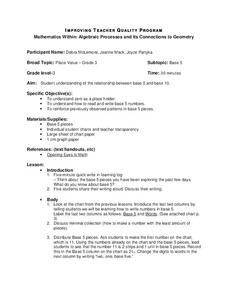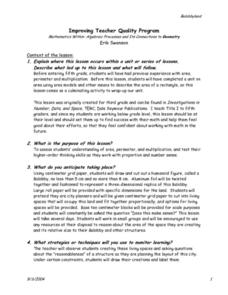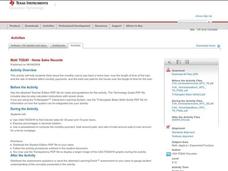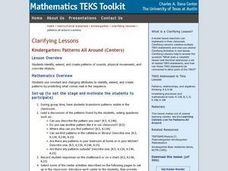Curated OER
Volume and Surface Area: Which Is More?
Students explore the volume and surface area of three dimensional figures. Through the use of video, students discover three dimensional shapes, their uses in real-life applications, and methods used to calculate their volume and surface...
Curated OER
Chart Your Course
Students explore change represented in graphs comparing distance and time. They exchange and share their graphs. Students interpret and create distance versus time line-graphs, and write stories based on these graphs. They interpret a...
Curated OER
Place Value
Third graders study the relationship between base 5 and base 10. They determine zero is a place holder and how to read and write base 5 numbers. They reinforce previously observed patterns in base 5 pieces. They choose another base and...
Curated OER
Measuring the Area of Polygons
Fourth graders use pattern blocks to explore areas of polygons. They explain that the answers to the area of the same polygon vary according to the units of measurement used. They visualize how different units of measurement can be used...
Curated OER
Balobbyland City Planners
Students create a mini city using proportions that fit a model human they construct using tin foil. They plan the city including a library, sports arena, living spaces, parks and businesses. When constructing the paper buildings, they...
Curated OER
Exploring Infinite Series through Baravelle Spirals
High schoolers are introduced to the concept of convergent infinite series using a recursive geometric construction. They explore the concept of a convergent infinite series using partial sums. Students use formal calculations,...
Curated OER
Home Sales Records
Teach your class how to calculate monthly payments on a home mortgage. In this percent lesson, young scholars calculate the monthly payment on a home mortgage, and compare different lengths of time and the interest rates for national...
Curated OER
Quilting with Middle School Students: Using Proportionality to Develop Quilt Designs
Students use quilt patterns to illustrate ratios. In this fractions instructional activity, students color quilt patterns using given fractions and ratios of colors. A finished "quilt" is assembled from the work of the students. This is...
Curated OER
Calculations at the Crazy Cookie Company
Learners explore matrix multiplication and problem solve using matrix multiplication. They design a table that will display cost and profit for three cookie stores.
Curated OER
Infinity
Students determine the sum of an infinite geometric series. In this determining the sum of an infinite geometric series lesson, students discuss how the sum of an infinite geometric series is a paradox. Students use the sum of an...
Curated OER
Recognize, create and Record Simple Repeating Patterns
Students analyze, create, and record repeating patterns. In this geometry instructional activity, students create shapes using patterns and keep track of the different shapes. They incorporate transformation and reflections into their...
Curated OER
The Rocket Sled
In this secondary mathematics worksheet, high schoolers use the given information regarding a rocket’s distance and time to calculate the speed of sound. The one page worksheet contains one problem with the solution.
Curated OER
Identify the Shape
10 this geometry worksheet, students identify the different angles created by polygons and name the shape created based on the number of sides. There is an answer key.
Curated OER
Using Mathematics to Explain the Spread of Diseases
Students use statistics to solve problems based on the spread of disease. In this disease lesson students study the role that viruses and bacteria play in the spread of diseases and explain pandemics.
Curated OER
Studying Living Organisms
Young scholars discover and discuss the differences between prokaryotes and eukaryotes. Using a microscope, they examine various prepared slides of prokaryotic and eukaryotic organisms.
Curated OER
Cups and Cubes
Third graders explore the use of cups and counters as a model to analyze the effects of operations. They create and use a rule to create a sequential pattern and use cups and cubes to model the relationship.
Curated OER
Lollies, Lollies, Lollies
Students listen to the problem read to them. They answer some simple questions using number sentences. They then compose a written record of the solution and share their approaches used.
Curated OER
Reaching New Heights
Students explore the relationship between two variables. Students measure their arm span and height. They gather this class data to design a scatter plot. Students interpret the meaning of individual coordinates and the overall graph....
Curated OER
National Symbol Patterns
Students discuss and create their own patterns. They practice and improve on making patterns of their own using red, white, and blue paper for a national theme. The symbols are based on what the teacher picks for the class.
Curated OER
Water Resources
Learners explore the differences between surface water and ground water. They collect data using maps and graphs and investigate a Texas river basin and a nearby aquifer. They complete a written report of their findings regarding the...
Curated OER
Prime and Composite Numbers with use of manipulatives (Elementary, Mathematics)
Students learn what prime and composite numbers are. They learn how to identify them by working in a group and demonstrating an understanding of one work problem with 100% accuracy using the manipulatives provided.
Curated OER
More or Less Pigs in the Pen
Students practice simple addition and subtraction. They identify relationships among whole numbers.
Curated OER
Patterns All Around (Centers)
Students identify, extend, and create patterns of sounds, physical movements, and concrete objects. They brainstorm patterns found in the classroom. Students use mathematical attributes to identify patterns and predict what comes next.
Curated OER
Grade 2: Texas Problem Solving
Second graders use numerical data about Texas to write and solve real-life problems involving addition and subtraction (or multiplication and division). They work in pairs to choose three numerical facts about Texas to use to make up...
Other popular searches
- Patterns Algebraic Thinking
- Algebraic Reasoning Unit
- Patterns, Algebraic Thinking
- Tiles Algebraic Thinking
- Algebraic Thinking in Music
- Algebraic Thinking Graphing
- Basic Algebraic Reasoning
- Algebraic Thinking Textbooks
- Algebraic Thinking/pattern
- Algebraic Thinking Part 2
- Algebraic Reasoning Assessment

























